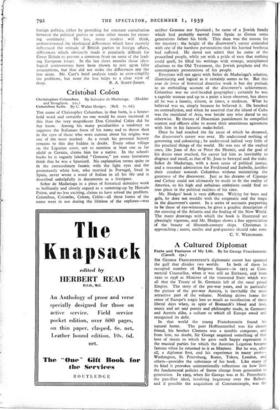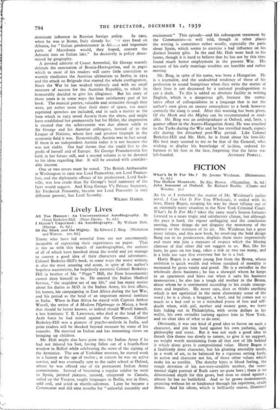A Cultured Diplomat
Facts- and Features of My Life. By Sir George Franckenstein. (Cassell. iss.)
Ste GEORGE FRANCKENSTEIN'S diplomatic career has spanned the gulf that divides two worlds. In both of them he occupied number 18 Belgrave Square—in 1913 as Com- mercial Counsellor, when it was still an Embassy, and from 1920 to 1938 as Minister of the truncated State which was all that the Treaty of St. Germain left of the once proud Empire. The story Of the pre-war years, and in particular the picture of the pre-war Austria, is inevitably the most attractive part of the volume. Nothing drives home the sense of Europe's tragic loss so much as recollection of those liberal days when, in spite of Bismarck's blood and iron, music and art and poetry and philosophy made, in Germany and Austria alike, a culture to which all Europe owed and recognised its debt.
In that world the young Franckenstein found his
natural home. The poet Hoffmannsthal was his closest friend, his brother Clemens was a notable composer, and from him, no doubt, Sir George acquired something of that love of music to which he gave such happy expression in the musical parties for which the Austrian Legation became famous when he returned to it as Minister. But he was, after all, a diplomat first, and his experience in many posts— Washington, St. Petersburg, Rome, Tokyo, London, and others—provides the substance of his book. Like many of its kind it provokes unintentionally reflections on how little the fundamental policies of States change from generation to generation. In 1903, when Sir George was at St. Petersburg, the pan-Slav ideal, involving hegemony over the Balkans and if possible the acquisition of Constantinople, was the
dominant influence in Russian foreign policy. In 1905, when he was at Rome, Italy already hac 'er eyes fixed on Albania, for " Italian predominance in and important parts of Macedonia would, they hoped, convert the Adriatic into an Italian lake." So decisively is policy deter- mined by geography. A devoted admirer of Count Aerenthal, Sir George warmly defends the annexation of Bosnia-Herzegovina, and in pages which to most of his readers will carry little conviction as warmly vindicates the Austrian ultimatum to Serbia in 1914 and the attack on Belgrade that started the whole conflagration. Since the War he has worked tirelessly and with no small measure of success for the Austrian Republic, to which he honourably decided to give his allegiance. But his story of those years is in some ways the least satisfactory part of his book. The musical parties, valuable and attractive though they were, get rather more than their share of space, too many reprinted speeches are included, and in such a matter as the loan which in 1923 saved Austria from the abyss, and might have established her permanently but for Hitler, the impression is created that the achievement was due almost solely to Sir George and his Austrian colleagues, instead of to the League of Nations, whose first and greatest triumph in the economic field it was. Economically, Austria was in fact saved. If there is no independent Austria today it is not because she was not viable. She had shown that she could live to the profit of herself and of Europe. Sir George Franckenstein has faith in her future still, and a second volume is to be devoted to his ideas regarding that. It will be awaited with consider- able interest.
One or two errors must be noted. The British Ambassador at Washington in 1902 was Lord Pauncefote, not Lord Paunce- fort, and the diplomatic offence of his predecessor, Lord Sack- ville, was less crude than Sir George's brief summary of the facts would suggest. And King George V's Private Secretary, Sir Frederick Ponsonby, became not Lord Ponsonby (a very different person), but Lord Sysonby.
WILSON HARRIS.













































 Previous page
Previous page